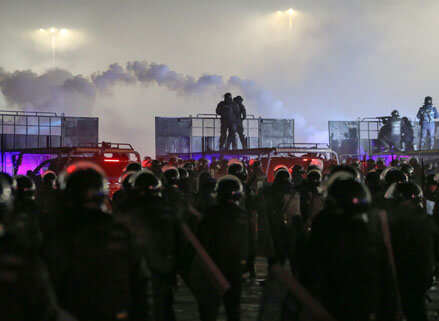
Kazakh law enforcement officers stand guard during a protest against LPG cost rise following authorities’ decision to lift price caps on liquefied petroleum gas in Almaty, Kazakhstan January 4, 2022.
Kazakhstan is in central Asia and shares borders with Russia and China. It declared independence from the Soviet Union in 1991, but the government has since maintained a close relationship with Russia. The Kazakh government began with moderate policies, but quickly became more authoritarian. The country was controlled by Nursultan Nazarbayev from its independence until he resigned in 2019. Political activity was heavily restricted, and opposition was often met with force. Kassym-Jomart Tokayev was elected president in 2019, but he continued to jail protestors and the 2021 parliamentary elections were held with no opposition parties participating.
At the beginning of 2022, the Kazakh government ended a federal price limit on liquified petroleum gas (LPG)—a vehicle fuel. It hoped the move would end fuel shortages and encourage competition in the energy market. Instead, fuel prices doubled overnight, and protests spread across the country. The price limit was reinstated, but the protests expanded because of a general dissatisfaction with the authoritarian government. Government forces responded violently, and dozens of protesters were killed. Tokayev called for assistance from the Collective Security Treaty Organization (CSTO)—a Russian-led military alliance—and troops were deployed on January 6. Russia has said that alliance troops will only be used to protect federal buildings.
On the morning of January 7, Tokayev gave Kazakh forces the authority to “kill without warning”. The escalation has many observers concerned, but Russia and China have voiced their support for the Kazakh government. Internet service and cellular communications have been disrupted in the country, so it has been difficult to get a clear picture of what is happening on the ground. It is unclear what the resolution will be, or when it will come, but a peaceful resolution seems unlikely.
Image credit: ©Pavel Mikheyev/Reuters/Alamy
Sources
- Kazakhstan
(Source: Encyclopaedia Britannica Online; accessed January 7, 2021) - Dozens of protesters reported killed in Kazakhstan as Russia-led military alliance heads to the country
(Source: CNN; accessed January 7, 2021) - Kazakh president: Forces can shoot to kill to quell unrest
(Source: AP News; accessed January 7, 2021)



